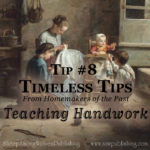What If My Student Hates Writing?
 What if my student hates writing?
What if my student hates writing?
It can be easy to panic when we come to a question like that, and to feel that something must be seriously wrong with them—or us—in consequence. After all, children are kind of a reflection on their parents, aren’t they? If a child is struggling, it might be the parent’s fault—or the teacher’s. And—what if the parent and the teacher are the same person?
Does it mean my kid and I are both failing if my student hates writing?
The good news is, that it’s actually far from being that bad. There are many simple causes with equally simple solutions that can completely reverse the student’s perspective toward writing, and allow their talents to blossom.
It begins with identifying the problem.
Does Your Student Hate Writing or Just Writing Compositions?
The first question to ask ourselves when we have a student struggling with writing compositions is whether they actually struggle with writing or only with writing school assignments. While this might seem like an issue of semantics, it is really a valid and vital distinction.
A child may struggle to write on a topic they are not interested in, or have trouble writing when they feel uninspired, and yet write very well in their free time when an idea strikes them.
In school, I detested most of my writing assignments; the “three-point essay” most of all. Even today I struggle with writer’s block when my inspiration is low and I just don’t “feel” like writing. Yet it’s no stretch to say I like writing—in fact, I love it.
There is no great cause for alarm if a child is writing in their free time, even if they hate writing specified assignments in school hours.
 Does Your Student Hate Creating Content or Just Manually Expressing It?
Does Your Student Hate Creating Content or Just Manually Expressing It?
Many children are held back in writing, not because they dislike composing the content, but because of the difficulties in manual dexterity which are connected with writing down their thoughts.
Once again, this makes a big difference. If your child’s difficulty is one of manual dexterity, it will probably recede as they get older.
It can be easy to forget the difficulty which writing may pose to children. Imagine yourself trying to write an essay with your left hand (or your right hand, if you happen to be left-handed!)—no matter how much you love writing, you will probably not enjoy the process due to the lack of manual dexterity in your non-dominant hand.
To summarize, this type of “hating writing” is not really hating writing at all, and parents shouldn’t look on it as an indication that their child has any trouble with the actual content-creation which is the core of writing. And, as we will explore later on, this is a problem which can be easily solved, too!
Do Your Student’s Talents Lie in Another Direction?
While this is not the cause of all, maybe not even of the majority, of writing difficulties, it remains a fact that there are some children whose talents do not lie in this direction.
“Everyone is a genius. But if you judge a fish by its ability to climb trees, it will spend its whole life thinking it is stupid.” – Author Unknown
This is one of the many reasons why we homeschool in the first place: so that we can let our children develop their own particular strengths. Yes, we need to equip our children for whatever situations they are likely to meet with in life, but beyond this, we don’t need to pressure them to excel in a subject that isn’t their line of talent.
This is especially important to remember when our own talents do lie in that direction. We are trying to raise our children to use their talents for God’s glory—not our talents.
The younger the child is, the more mindful we need to be about this. We should be careful to foster an enjoyment of education as far as possible by encouraging our children in cultivating their talents, whatever those may be.
Creative Writing is About Creativity
We also need to remember that we can tend to be more anxious about these types of issues than we need to be.
Even if our students don’t love writing, there are many ways we can direct them and help to make writing a more positive experience.
Here are a few suggestions:
– Assign writing on topics you already know the student is passionate about. Although many English courses give a list of suggested topics for compositions and essays, these are really only suggestions. Don’t hesitate to replace them with themes that will engage your student and give them a better chance at writing successfully.
– Encourage spontaneous writing out of school hours. This is particularly useful in the case of students who struggle to write without inspiration. When they really are inspired (which is unfortunately not always during their English course) they may put considerable effort into writing on something that interests them. We probably all remember incidents in childhood story books of children who started a household newspaper, for instance. This is an excellent opportunity, and one which parents should encourage as much as they can. (And just having parents “subscribe” to the paper can be a big encouragement!)
– Look for ways to minimize mechanical obstacles. I am a firm believer in the value of teaching children the manual exercise of writing. At the same time, there is considerable wisdom in keeping penmanship and creativity apart, at least for students who struggle with the physical side of writing a composition. Allowing them to type instead of writing an assignment or encouraging them to dictate while you write may just remove the barriers that have stood in the way of progress.
– Encourage correspondence. This is a topic that was brought up by one of our readers. Whether or not your student likes writing letters, they probably like receiving them! The fun of getting mail with your name on it can make correspondence a positive, even if writing the replies poses a challenge. Many homeschoolers make letter-writing a part of their school week, and this is a fabulous way to encourage students to write.
– Make writing practical. I would heavily emphasize this, particularly for students who really do not have a talent in writing. The reason you are insisting they learn to write is because they will need it in some form later in life. Try to keep your assignments connected to that aim. Even if the student hates the exercise, they will understand why have to go through it. Deep down, we all struggle to complete a disagreeable task when it seems to have no point. The correspondence assignments mentioned above are a great place to start. We can all understand the value of sending a letter to an elderly family member or a sick friend. The advent of email has also introduced another practical avenue for using writing skills, one which nearly all of us will encounter sooner or later.
– And most importantly of all, don’t let reading and writing be tied together. Writing is only one part, and a very small part, of language arts. If your child loves books, even if he only loves them when somebody else reads them to him, you may be sure he is learning English and literature, even if he hates writing.
If Your Student Hates Writing – Don’t Worry!
Our tendency as human beings is to take alarm far sooner than we need to. As homeschoolers, we take our children’s success personally, and this can lead us to panic unnecessarily.
There are many simple causes for a child’s dislike of writing that actually have nothing to do with the invention and creativity of composing content. These causes can be easily overcome by thinking outside of the box, which is something that homeschoolers know all about!
Even if our children have no particular talent in this direction, we can approach writing in a way that will make it as fun and practical as possible for them, and will allow them both the benefits of a well-rounded education and the space to develop the talents which they do have.
At the end of the day, for a child to hate writing does not mean something is seriously wrong with their education. It just means that we need to find another way of teaching and/or presenting the subject so that they can derive the maximum benefit—and pleasure—from their learning experience.
If you are looking for ways to expand your student’s language skills, read our post on how to make vocabulary a family pursuit:
You might also enjoy:

How can we teach our daughters to be godly, virtuous women? Timeless Tip #8 uses handwork as a powerful tool to educate children in the virtue of diligence.

Wondering what to do with your preschoolers while the “big kids” are busy with lessons? Here are five strategies for including preschoolers in your homeschool day.

Are you feeling uncertain which way to go? Trust in the God Who guides His children safely on the seas of life, and into the harbour of Heaven.

